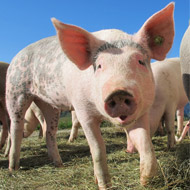
VMD publishes outcome of European referral
The benefit/risk balance for veterinary medicines containing zinc oxide is negative and should be withdrawn, the EMA Veterinary Committee has concluded.
Earlier this year, France and the Netherlands submitted a class referral to the European Medicines Agency (EMA) for all veterinary medicines containing zinc oxide administered by mouth to all food producing animals.
The referral was made over concerns that zinc oxide presents a risk to the environment and the co-selection of antimicrobial resistance.
Following a re-evaluation of the product, the EMA’s Committee for Medicinal Products for Veterinary Use (CVMP) concluded that the treatment benefits of zinc oxide for the prevention of diarrhoea in pigs did not outweigh the environmental risk associated with their use.
Furthermore, the CVMP acknowledged that there is a risk of co-selection for resistance associated with the use of zinc oxide. However, that risk is currently not quantifiable.
Commenting, a VMD spokesperson said: “Based on its scientific conclusions, the committee recommended withdrawal of the marketing authorisations for the products. All EU Member States (MS) are represented on the CVMP; members from the UK supported the CVMP Opinion."
In the UK, there are three veterinary medicines authorised for oral administration to food producing animals that contain zinc oxide. The medicines are all authorised for use in piglets for the prevention, treatment and control of diarrhoea.
For details of the authorised products, please refer to the Product Information Database.



 The Federation of Independent Veterinary Practices (FIVP) has announced a third season of its podcast, Practice Matters.
The Federation of Independent Veterinary Practices (FIVP) has announced a third season of its podcast, Practice Matters.